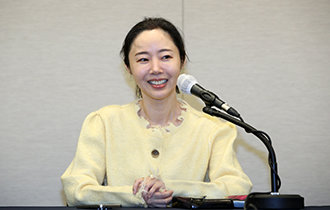New Finance Minister Forecasts Minus Annual Growth
New Finance Minister Forecasts Minus Annual Growth
Posted February. 11, 2009 09:41,
New Strategy and Finance Minister Yoon Jeung-hyun said yesterday that the Korean economy this year will see negative growth and high unemployment.
By being honest, Yoon apparently wants to restore market confidence and persuade Koreans to share the burden. There is no magic wand to help the economy overcome mounting difficulties overnight, he said after his confirmation.
Yoons economic policies are similar to those of his predecessor Kang Man-soo, but go one step further in certain sectors such as jobs and restructuring.
○ Lower growth target
Officials at the Strategy and Finance Ministry are known to have been shocked by Yoons announced forecast of minus growth given the negative effects of his comment on the countrys confidence.
Former finance ministers had announced their economic growth targets reflecting the expectations of the governments determination and the effects of economic stimulus packages.
I forecast the Korean economy will contract two percent based on the opinions of experts. Well establish effective measures such as drawing up extra budget to help the economy grow instead of shrink, Yoon said.
The governments adjusted growth forecast is close to minus 2.3 percent, the average of economic forecasts released by 10 major investment banks.
Being honest is the first step to restore confidence in the market and people. I believe Korea can overcome the recent economic difficulties only when the government is honest about economic conditions, Yoon said.
○ Emphasis on jobs, consumption and restructuring
The new economic team led by Yoon has suggested six major goals: allocating supplementary budget earlier than expected; alleviating the credit crunch; job sharing; supporting the newly poor; strengthening the competitiveness of the service industry; and effective restructuring.
He said he will draw up the supplementary budget proposal this month, negotiate with relevant agencies and the ruling Grand National Party, and submit it to the National Assembly by the end of March.
Experts predict a supplementary budget of 15 trillion to 20 trillion won (10.8 billion to 14.4 billion U.S. dollars), far larger than the original suggestion of 10 trillion won (7.2 billion dollars). They said more supplementary budget is needed since the real economy has contracted far faster than expected and the economic downturn will result in a fall in tax revenue.
The ministry announced it has obtained 2.1 trillion won (1.5 billion dollars) in supplementary budget from the government surplus of 4.6 trillion won (3.3 billion dollars) last year.
Yoon also proposed a job retention fund at low interest to encourage companies to retain staff.
He also reiterated that corporate restructuring will be led by creditors, and that the government will pursue macro strategic restructuring connected to industrial policies at the same time. In other words, the government wants room to intervene in restructuring since creditors are likely to remain passive to pursue their own interests.
The government will make an all-out effort to improve liquidity at financial institutions, the soundness of assets, and propriety of capital. If the efforts are insufficient to make changes, the government will consider injecting public funds, Yoon said.
cha@donga.com peacechaos@donga.com







